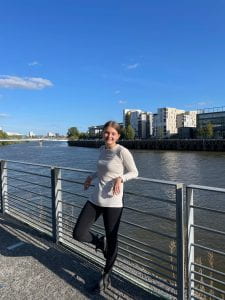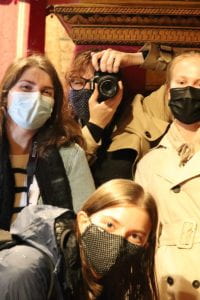Hello, everyone! I realize it has been a long time since I last made a blog post. I have been very busy with my activities in France and haven’t had the chance until now to sit down and collect my thoughts. I am currently on a train to La Rochelle, France to visit my great grandmother’s friend. Nantes was an ideal study abroad location for me as it is located only about an hour and a half away from my grandmother’s hometown where family friends still live.
In this post I will touch a bit on academics and my experience living with a host family. For those of you who are interested in studying abroad, I can imagine that these two aspects are important in choosing a program.
I am now a month into my classes. IES abroad gave us the option to “faire du shopping” for courses, which essentially means we had the first two weeks of the semester to try out courses before finalizing our academic schedule. I did a lot of “shopping,” trying out a handful of university courses as well as classes at the IES center, finally narrowing it down to five courses. At the IES center, I am taking a sociology course, an art history course, and a French language course; at the local university, I am taking a translation course with other IES students; finally, at the local fine arts university, I am taking a drawing course.
As a biology major, I will admit that this sudden onslaught of humanities courses has required an adjustment. I feel somewhat lost without the usual structured schedule of my chemistry and biology courses. However, I know that this experience will allow me to become more flexible in my learning style and improve my ability to adapt to new environments—valuable life skills. There is a noticeable difference between the teaching styles of French university courses and those at Whitman. The IES courses are certainly more liberal-arts oriented, but they often do not feel as intellectually engaging as those I have taken at Whitman. The homework load is light and sometimes the work feels like busy work. However, I think there is something to be said for having a lighter workload while studying abroad as it allows me more time to experience the culture. The translation course at the local university is interesting, and the professor puts in a lot of effort to engage with students, but it does feel more like a lecture course compared to the discussion-based humanities courses I have become accustomed to at Whitman. Lastly, the drawing course…this class is a large step out of my comfort zone! But it has been incredibly enjoyable while also nerve-wracking. I can’t say I am the best artist, but it has been fun to mess around with cross-hatching and charcoal portraiture.

Me next to the Loire river in the heart of Nantes, on my way to my drawing class at the Beaux-Arts university
Just a bit of food for thought for prospective study abroad students: if you are used to taking only four or five courses per semester at Whitman, you may find it a shock to have to take five to seven courses here. The IES courses are worth less credits, so you have to take more classes at a time. Of course, the workload is less per course, but it can be overwhelming to have to keep track of many subjects in different academic areas that are all fully taught in a foreign language. I wouldn’t label this as a positive or negative, but it is an aspect of the program to be aware of.
Aside from academics, I am lucky to be living with a host family this semester. Of all the IES Abroad programs, mine is the only one that is allowing host families this semester amid COVID-19 pandemic restrictions. I cannot imagine studying abroad without a host family and would encourage anyone to take advantage of the opportunity if given the option. I am living with a family of three—a host mom and dad, as well as a ten-year-old host brother. There is something incredibly comforting in being able to go “home” after a busy day of school, sit down at a dinner table, have a home-cooked meal served to me, and practice my French skills with natives. (Sidenote: I am vegetarian, and was placed with a vegetarian host family, which is so cool! Vegetarianism isn’t nearly as common in France as it is in the Pacific Northwest.) We usually eat simple but delicious meals such as a tomato and mozzarella salad as a starter with pasta and roasted vegetables for the main course.
I will admit that living with a host family can be exhausting sometimes. I must constantly adapt to their routine, way of life, and respect their desires and boundaries. I do sometimes feel like a permanent guest in someone else’s house, walking on eggshells. But this is not their fault in any way and is simply a necessary part of the adjustment period. My host parents are incredibly kind and have been very patient in welcoming me into their home. I get to practice my French language skills every night at the dinner table, and they are patient in correcting my mistakes and helping me form sentences.
Adjusting to a new culture is hard, but also exhilarating, and I feel fortunate to have many resources to help me along the way.

My friends and I at Chenonceau, a castle in the Loire Valley. We visited it on a recent weekend excursion trip organized by IES.
À bientôt,
Ella